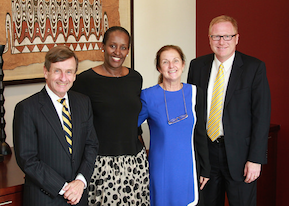
From left: RSPH dean Jim Curran, First Lady Jeannette Kagame, HIV/AIDS researcher Susan Allen, Vice Provost Philip Wainwright
Most of the discussion, when Rwanda’s First Lady Jeannette Kagame recently visited Emory, was not about HIV vaccines, and rightly so. It was about how far Rwanda has come as a country since the 1994 genocide [videos of author Philip Gourevitch discussing Rwanda].
Still, while introducing the First Lady and thanking her for her support of HIV/AIDS research in Rwanda, Susan Allen mentioned a clinical trial for a HIV vaccine that began last year in Rwanda, Kenya and the United Kingdom and is now wrapping up the vaccination phase. Her colleague in Kigali, Etienne Karita, is one of the principal investigators.
The vaccine uses replicating Sendai virus, which causes respiratory tract illness in rodents but not in humans, as a vector to deliver the HIV gag gene. The trial combines this vaccine, administered intranasally, in various configurations with an adenovirus-based vaccine. This is the first time that Sendai virus is being used in a HIV vaccine.
As IAVI Report’s Regina McEnery explains, researchers hope the Sendai vector might recruit targeted immune responses to mucosal tissues and provide an edge to the immune system when it is subsequently challenged by HIV.
In a future post, we plan to provide an additional update on HIV vaccine research, focusing on GeoVax and (separate, for comparison) a planned large-scale followup to the landmark RV144 Thai trial.




